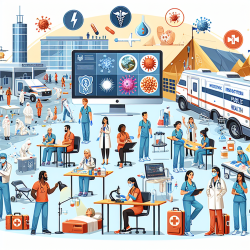In an era where public health threats such as bioterrorism and emerging infectious diseases are becoming increasingly prevalent, the role of public health nurses has never been more critical. The research article "The Role of Public Health Nursing in Emergency Preparedness and Response" highlights the essential functions and competencies required for nurses to effectively respond to these challenges. This blog post will explore how practitioners can enhance their skills by implementing the research outcomes or pursuing further study.
The Importance of Competency-Based Training
Public health nurses are at the forefront of emergency preparedness and response, often serving as first responders during public health emergencies. To fulfill this role effectively, nurses must possess a complex combination of knowledge, skills, and abilities. The research identifies three sets of competencies crucial for public health nurses: core competencies, public health nursing competencies, and specific bioterrorism and emergency preparedness competencies.
- Core Competencies: These encompass eight domains including analytic assessment skills, cultural competency, communication, and leadership. These are essential for all public health professionals.
- Public Health Nursing Competencies: Derived from core competencies, these are tailored to the unique responsibilities of public health nurses.
- Bioterrorism and Emergency Preparedness Competencies: These include specialized knowledge and skills necessary to respond to bioterrorism threats effectively.
Nurses should seek out training opportunities to master these competencies. The Centers for Disease Control and Prevention (CDC) offers competency-based training programs through a network of centers for public health preparedness. Engaging in such training ensures that nurses are ready to execute their roles during an incident.
Strategies for Improved Preparedness
The research emphasizes the need for improved preparedness among public health professionals. Here are some strategies that can be implemented:
- Developing Emergency Response Plans: Nurses should actively participate in writing and updating emergency response plans. These plans should establish relationships with other emergency response partners and address clinical protocols and safety measures.
- Understanding the Chain of Command: Familiarity with the incident command system is crucial for effective communication and coordination during emergencies.
- Continuous Education: Nurses should stay informed about the clinical manifestations of biological agents through print and online sources. This knowledge is vital for accurate diagnosis and effective communication with the public.
The Role of Public Health Nurses in Bioterrorism Response
The research outlines specific roles for public health nurses in responding to bioterrorism threats:
- Epidemiology and Surveillance: Nurses participate in disease outbreak investigations, identifying and interviewing individuals potentially exposed to bioterrorism agents.
- Triage and Treatment: In mass clinics or community outreach centers, nurses assess, triage, isolate, treat, and provide support for victims.
- Mental Health Support: Addressing the psychological impact of bioterrorism on victims and responders is a critical aspect of a nurse's role.
Nurses must also balance their professional responsibilities with personal preparedness. Developing disaster plans for home and family ensures that they can respond effectively without compromising personal well-being.
Pursuing Further Research
The article encourages ongoing research to evaluate the effectiveness of current preparedness plans and identify areas for improvement. Well-designed studies can clarify roles, improve coordination, identify resource gaps, and enhance overall response capabilities.
Nurses interested in advancing their expertise should consider engaging with professional organizations such as the Quad Council of Public Health Nursing Organizations or participating in workshops and conferences focused on emergency preparedness.
The role of public health nurses is evolving to meet new challenges in emergency preparedness. By implementing the strategies outlined in this research or pursuing further study, practitioners can enhance their skills and contribute significantly to protecting public health.
To read the original research paper, please follow this link: The Role of Public Health Nursing in Emergency Preparedness and Response.










